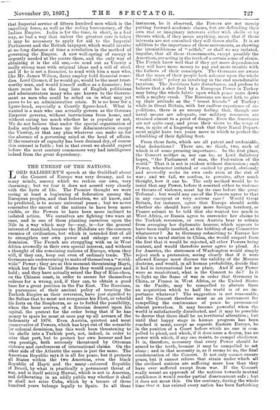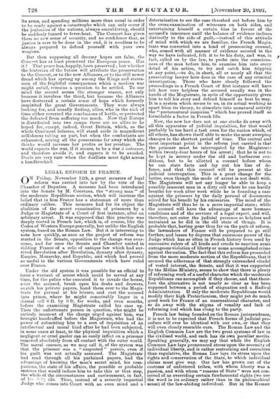THE UNREST OF THE NATIONS.
TORD SALISBURY'S speech at the Guildhall about I the Concert of Europe was very dreamy, and to many minds, among which we reckon our own, very charming ; but we fear it does not accord very closely with the facts of life. The Premier thought we were seeing at least a beginning of federation among the European peoples, and that federation, we all know, and he predicted, is to secure universal peace ; but we never remember the unrest of the nations to have been more visible, or the Powers to have been more inclined to isolated action. We ourselves are fighting two wars at once, and in one of them planting ourselves upon the Nile in a way which may be—nay, is—for the general interest of mankind, because the Mandist& are the common enemies of civilisation, but which is intended first of all to strengthen our own power and enlarge our own dominion. The French are struggling with us in West Africa avowedly in their own special interest, and without a thought of the remaining nations of Europe, whom they will, if they can, keep out even of ordinary trade. The Germans are endeavouring to make of themselves a "world- wide" Power ; they are at this moment threatening Hayti, which but for the United States they would conquer and hold ; and they have actually seized the Bay of Kiao-chou, on the Chinese coast, in order to secure for themselves redress for a wrong, and, if they can, to obtain a good base for a great position in the Far East. The Russians, in pursuance of their ancient policy of treating the Turkish Empire as their reversion, have just signified to the Sultan that he must not reorganise his Fleet, or rebuild his forts on the Bosphorus, so as to forbid the possibility, when the hour arrives, of a Russian descent upon his 3apital, the pretext for the order being that if he has money to spare he must at once pay up all arrears of the Indemnity of 1878. Even Austria, quietest and most conservative of Powers, which has kept out of the scramble or colonial dominion, has this week been threatening to ire shells into a Turkish port, not, indeed, in order to seize that port, but to protect her own honour and her Dwn prestige, both seriously threatened by Ottoman violence and carelessness of international claims. On the ether side of the Atlantic the scene is just the same. The American Republic says it is all for peace, but it protects ill States within the two Americas, even the black Republic of Hayti and the many - coloured Republic A Brazil, by what is practically a permanent threat of War, and is itself seizing Hawaii, which is not in America, Ind deliberating in an oddly public way whether it shall Dr shall not seize Cuba, which by a tenure of three hundred years belongs legally to Spain. In all these instances, be it observed, the Powers are not merely putting forward academic claims, but are defending their own real or imaginary interests either with shells or by threats which, if they mean anything, mean that if those interests are not consulted they will throw shells. It is an addition to the importance of these movements, as showing the irresistibleness of " selfish," or shall we say isolated, impulse, that all these Governments, except possibly the American, are acting in the teeth of a certain sense of strain. The French know well that if they get more dependencies they will have more money to pay and more trouble with the fathers of their conscripts. The Germans are aware that the mass of their people look askance upon the whole " world-wide " policy as involving in the end unendurable taxation. The Austrians hate disturbance, and profess to believe that a shot fired by a European Power in Turkey may bring the whole fabric upon which peace rests down with a mighty crash. The Russians are most loth to give up their attitude as the " truest friends " of Turkey ; while in Great Britain, with her endless experience of ex- peditions, there is an uneasy feeling that, though our naval means are adequate, our military resources are strained almost to a point of danger. Even the Americans are not quite easy, and press their views to the verge of war, in spite of a lingering wish that their Naval Depart- ment might have two years more in which to perfect the rebuilding of their fighting fleet.
From these facts, which are all patent and undeniable, what deductions ? There are, we think, two, each of which is of some pressing importance. In the first place, the Concert neither is, nor can be, as Lord Salisbury hopes, " the Parliament of man, the Federation of the world." That it is not is evident without discussion ; each Power, whenever irritated or excited by greed, obviously and avowedly seeks its own ends even at the risk of war ; and we fail, we confess, to perceive, after much thought, how it can be. The only method would be to insist that any Power, before it resorted either to violence or threats of violence, must lay its case before the great Tribunal ; but would any one of the Powers agree to that in any emergent or very serious case ? Would Great Britain, for instance, agree that Europe should settle whether she should have any more foreign territory, or France submit to be told that she wanted too much in West Africa, or Russia agree to surrender her claims to the Turkish reversion, or even Austria bear to refrain from avenging her diplomatic honour, which appears to have been really insulted, at the bidding of any Committee whatsoever ? As to Germany submitting to Europe her claim to a naval station in China, she would suspect from the first that it would be rejected, all other Powers being content, and would therefore never agree to plead. As for America, the statesmen of Washington would simply reject such a pretension, seeing clearly that if it were allowed Europe must discuss the validity of the Monroe doctrine, and would, in all human probability, decide that it had in international law no place. And if any Power were so recalcitrant, what is the Concert to do ? Is it to light up the flame of war in order that Germany in China, or France in West Africa, or the United States in the Pacific, may be compelled to abstain from an acquisition which to half the world is of no im- portance whatever ? The suggestion is not reasonable, and the Concert therefore must as an instrument for compelling the continuance of peace be pronounced almost powerless. It may become powerful when the world is satisfactorily distributed, and it may be possible to decree that there shall be no:territorial alteration ; but until that happy stage in human progress has been reached it must, except as regards Eastern Europe, be in the position of a Court before which no one is com- pelled to plead, and which, if it does issue a decree, has no power with which, if any one resists, to compel obedience. It is, therefore, necessary that every Power should be armed to the teeth, because it may be compelled to act alone ; and in that necessity is, as it seems to us, the final condemnation of the Concert. It not only cannot ensure peace, but it cannot relieve that strain under which all the civilised nations are suffering more loss than they have ever suffered except from war. If the Concert really meant an approach of the nations towards mutual confidence it would render partial disarmament safe ; but it does not mean this. On the contrary, during the whole time that it has existed every nation has been furbishing its arms, and spending millions more than usual in order to be ready against a catastrophe which can only occur if the jealousies of the nations, always smouldering, should be suddenly fanned to fever-heat. The Concert has given them no new sense of security, and no confidence that, as justice is sure to be done in the end, it is needless to be always prepared to defend yourself with your own weapons.
But then supposing all dreamy hopes are false, the Concert has at least preserved the European peace. Has it ? That peace has, happily, been preserved ; but whether the historian of the future will attribute the preservation to the Concert, or to the new Alliances, or to the still newer dread which has sprung up among the Kings and states- men of the frightful consequences which a modern war might entail, remains a question to be settled. To our mind the second seems the stronger reason, not only because it involves the third, but because the Alliances have destroyed a certain sense of hope which formerly inspirited the great Governments. They were always looking for, and usually finding, allies, who in the nick of time either reversed the conclusions of battle, or protected the defeated from suffering too much. Now that Europe is distributed into two camps there are no allies to be hoped for, except, indeed, Great Britain, which, as the whole Continent believes, will stand aside in magnificent selfishness taking no part, but when the combatants are exhausted, seizing all the possessions far away which she thinks would increase her profits or her prestige. The world expects the war, if it occurs, to be a war a entrance, and therefore avoids it, and expects it to be avoided. Duels are very rare when the duellists must fight across a handkerchief.























































 Previous page
Previous page